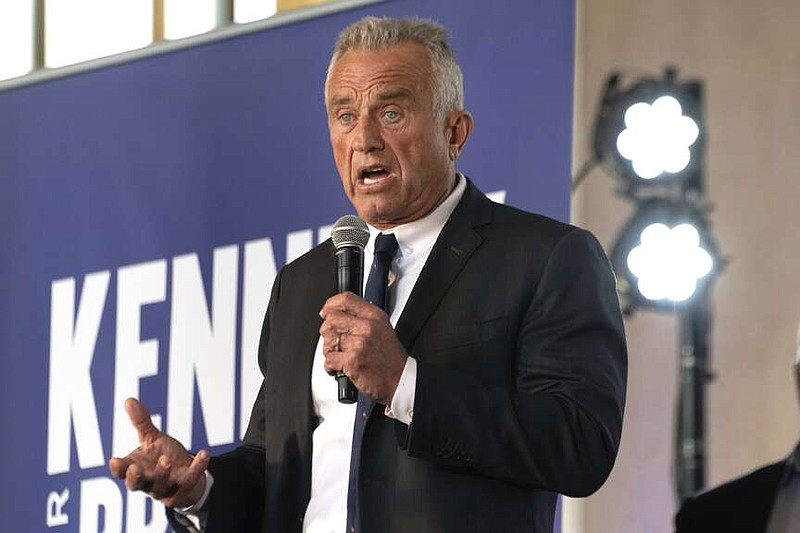Independent presidential candidate Robert F. Kennedy Jr. in a lengthy statement Friday suggested that the prosecution of rioters who violently stormed the U.S. Capitol on Jan. 6, 2021, might be politically motivated, partly aligning himself with the portrayal being pushed by former President Donald Trump and his allies.
The statement came a day after Kennedy came under fire for a fundraising email that painted a sympathetic portrait of the rioters as "activists" who were "stripped of their constitutional liberties."
While Kennedy's campaign said it had severed ties with a contractor who sent the fundraising email, his latest statement struck a similar tone. Rather than disavowing the idea that the rioters are being prosecuted unjustly, Kennedy has embraced it, saying he is "concerned about the possibility that political objectives motivated the vigor of the prosecution of the J6 defendants."
When it comes to the events of Jan. 6, Kennedy said: "I want to hear every side."
Kennedy in his statement does partially criticize Trump -- saying the riot at the Capitol happened with his "encouragement" and "in the context of his delusion that the election was stolen from him." Yet Kennedy said as president he would appoint a special counsel to look into whether Trump allies were unfairly singled out for prosecution, "and I will right any wrongs that we discover."
Trump routinely calls those convicted for the Jan. 6 riot "hostages" and has promised to pardon them if he wins back the White House.
Kennedy in his statement also claims that the rioters did not carry weapons. In fact, some members of the mob carried guns, and one was recently charged with firing a shot into the air during the riot. Other rioters used things like flagpoles, a crutch, a hockey stick, a lacrosse stick, pepper spray and a PVC pipe to attack officers.
Kennedy later retracted that claim with a statement Friday evening saying: "My understanding that none of the January 6 rioters who invaded the capitol were carrying firearms was incorrect. Several have been convicted of carrying firearms into the Capitol building. Others assaulted Capitol police with pepper spray, bludgeons, and other makeshift weapons.
"This behavior is inexcusable," he added. "I have never minimized or dismissed the seriousness of the riot or any crime committed on that day."
The violence on Jan. 6 was extensive. The mob of Trump supporters stormed past police barriers, engaged in hand-to-hand combat with officers, smashed windows and poured into the Capitol building, sending lawmakers running into hiding.
Police officers were bruised and bloodied as they were dragged into the crowd and beaten. One officer was crushed in a doorframe and another suffered a heart attack after a rioter pressed a stun gun against his neck and repeatedly shocked him.
More than 1,300 people have been charged in the riot at the Capitol, including roughly 500 people accused of assaulting, resisting or impeding officers. About 1,000 have pleaded guilty or been convicted by a judge or a jury of crimes including seditious conspiracy, assault and civil disorder. Only two defendants have been cleared of all charges after a trial, both by judges who decided the case without a jury.
Of the more than 800 rioters who have been sentenced, at least 229 have received at least one year behind bars, according to an Associated Press review of court records. The longest sentences so far have gone to the leaders of two far-right extremist groups -- the Oath Keepers and the Proud Boys -- who were convicted of seditious conspiracy after trials that showcased weeks of plotting to use force to stop the transfer of presidential power from Trump to Biden.
Judges overseeing the cases in Washington's federal court have routinely stressed that the rioters are being punished for their actions, not their political beliefs. Judges appointed to the bench by presidents of both political parties have sought to use their platforms to combat distortions about the attack and admonish rioters for casting themselves as victims of political persecution.
Under Justice Department rules, the attorney general -- not the president -- appoints special counsels. And special counsels have historically been appointed to investigate crimes, like in the cases against Trump, not to second-guess decision-making by Justice Department leadership.
Kennedy portrayed Trump, who faces dozens of charges in four jurisdictions, as a victim of a politically motivated government, echoing both the former president's own characterization of the charges as corrupt and claims from Republicans in Congress that federal agencies are "weaponized" against conservatives.
"One can, as I do, oppose Donald Trump and all he stands for and still be disturbed by the weaponization of government against him," Kennedy said.
Information for this article was contributed by Eric Tucker, Michael Kunzelman and Michelle R. Smith of The Associated Press.
